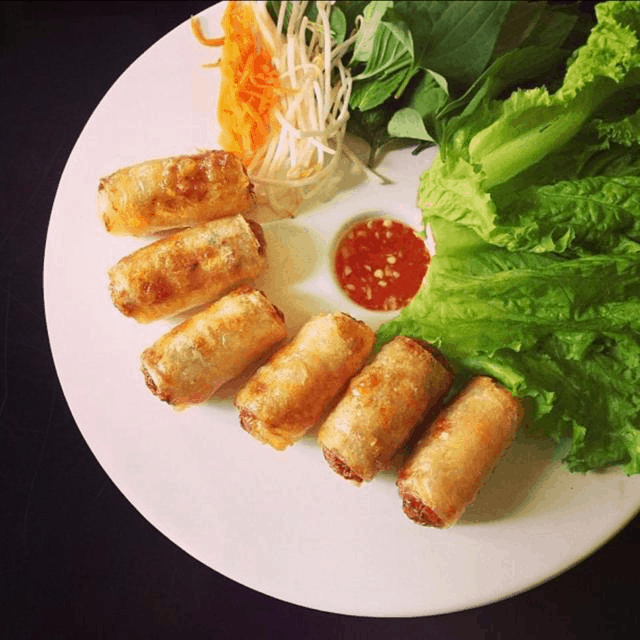Shrimp ram is the next dish to attract diners. The shrimp ram dish is almost like the spring rolls of the Northern people, but it has its own flavor and processing, simple, simple but no less interesting.
The ingredients to make Quang Nam shrimp ram are very simple: pork belly, shrimp, medium-sized spring rolls, 1 chicken egg, and seasonings: salt, main noodles, minced red onion, garlic, pepper and green onions. Unlike spring rolls from the North, where the ingredients need to be minced or pureed, Quang Nam shrimp ram has a special flavor thanks to the ingredients being left intact.
Just like fried spring rolls, in order for the ram to be crispy, it should only be fried on low heat, when the ram is golden, it is cooked. Shrimp ram is best when eaten hot, because of the greasy and fragrant, fatty meat of the meat, along with the crispy taste of the shrimp with the shell on, green onions combined with sweet and sour dipping sauce, adding a little spicy chili, the taste will be irresistible. who forgot. Shrimp ram should also be enjoyed in combination with chopped raw vegetables, whether eaten with vermicelli, or rice, is appropriate. Among the many specialties of Quang, shrimp ram is an easy dish to suit the taste of all diners in different regions.

Photo: Collectibles
Source: Collected internet.
Festivals are one of the special features in Vietnamese culture. The diversity of ethnic religions makes Vietnam one of the countries with many festivals. Festivals are held to commemorate cultural events. Community spirit is the essence of every festival. There are two parts to festivals: ceremony and festival. The ceremony is to express respect for divinity and people's dreams of health, wealth, luck and happiness for themselves and their loved ones. Festivals are unique features of culture, community, religion, etc. The two biggest traditional festivals are Lunar New Year and Hung King's Death Anniversary. During Lunar New Year, each region has other festivals to celebrate such as Lim Festival in Bac Ninh province, Giong Festival in Soc Son, Perfume Pagoda Festival in Hanoi. Hung King's death anniversary is held every year from the 8th to the 11th of the third lunar month. It is organized so that everyone remembers their roots. With many landscapes recognized by UNESCO as world natural heritage and a wealth of unique regional cultural spaces, Vietnam is a legendary land and also a storehouse of attractive material for filmmakers to exploit. long lasting waterfall.
Vietnam is a country with 54 different ethnic groups, each of which has its own unique and impressive culture and identity. It is this difference in ethnic composition that has contributed to creating a very diverse, rich and unique beauty for Vietnam's culture that no other country can replace. Customs in Vietnam have a long tradition spanning thousands of years, it has become customary law, deep and firmly embedded in the hearts of every Vietnamese person.
Vietnamese culture is one of the oldest cultures in the Pacific region. Although located next to two major cultures, Chinese and Indian culture, Vietnam still preserves many of its own cultural features, expressed in many aspects such as traditional customs that still exist today. Nowadays, Vietnamese people's life and folk literature are rich and unique. It can be said that Vietnamese culture is a special blend of many ancient cultures along with the indigenous culture of the Vietnamese people. In addition to the greatest influence of China, there is also the influence of Indian and Cham culture. , and later the great influence of Western culture (France, Russia, America).
Hang Market (Hai Phong) was formerly the market of an ancient village called Du Hang (17th-18th centuries). The Du Hang village area was formerly agricultural land and a traffic hub, so Hang market became a place to meet, exchange, and buy and sell plants, animals, and farming utensils. The urbanization process spread to the suburbs, so today Hang Market is located entirely in the inner city, in Du Hang Kenh ward, Le Chan district, Hai Phong city. Even though many years have passed, the customs of exchanging agricultural goods of c